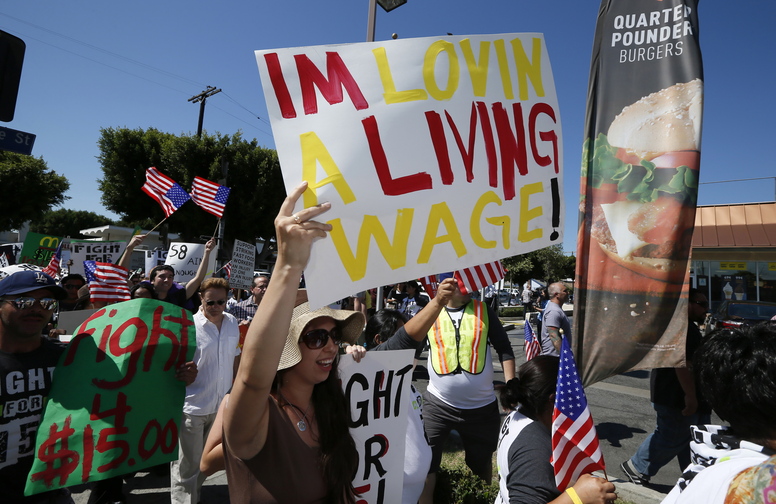States and municipalities across the country are leading a localized push to raise the minimum wage, driven largely by Democrats, who see an opening to appeal to working class Americans at a time of growing inequity.
Efforts in Congress to raise the national minimum wage above $7.25 an hour have stalled. But numerous local governments are forging ahead, in some cases voting to dramatically increase the pay of low-wage workers.
The efforts, while supported by many unions, threaten to create a patchwork of wage rates that could mean workers in some areas will be entitled to vastly less than those working similar jobs nearby. The campaigns reach from coast to coast.
As minimum wage fights have gone increasingly local, Democrats have led the charge, working to define themselves as the party of blue-collar workers while casting Republicans as defenders of corporations and big business.
Backing minimum wage increases, even in otherwise conservative states, sharpens that definition, they believe. Minimum wage increases have broad public support, and income inequality issues have touched a nerve in many places.
“When the pope starts criticizing trickle-down economics, you know the gulf between rich and poor has become too much to ignore,” said Tom Lindenfeld, a Democratic consultant with close ties to labor unions.
President Obama has called for an increase in the national rate, mentioning it in his most recent State of the Union address and recently signing onto a proposal from congressional Democrats to set a $10.10 hourly rate. But congressional Republicans have opposed any increase, saying it would hurt employers and curtail job growth.
“When you raise the price of employment, guess what happens? You get less of it,” House Speaker John Boehner, R-Ohio, said in February.
Many states long ago set their rates slightly above the federal minimum, and a handful of cities – notably San Francisco and Santa Fe, N.M. – joined them. The District of Columbia has set its minimum wage at $1 above the federal standard since 1993. But the recent push is distinguished by the number of jurisdictions involved and the magnitude of the increases proposed.
“Congress can’t do anything right now, and even if they could, they wouldn’t even come close to the level that various cities and states around the country are looking at,” said Phil Mendelson, the Democratic chairman of the District of Columbia Council, which is expected to take an initial vote Tuesday setting the city’s minimum wage at $11.50 an hour by 2016.
Councils in Maryland’s Montgomery and Prince George’s counties voted this week to reach $11.50 – higher than any rate in effect in the United States – by 2017.
This year, a group of unions, led by the Service Employees International Union, spurred efforts to raise the minimum wage to $15 an hour for airline and restaurant employees at Seattle-Tacoma International Airport. Voters in 2012 decided to increase the minimum wage in Albuquerque, N.M., to $8.50, and have yearly cost-of-living bumps, beginning this year.
The California legislature, which is dominated by Democrats, passed a law over Republican objections this year to raise the minimum wage to $10 an hour by 2016. Massachusetts lawmakers also are considering a $10 wage.
Even in red states, Democrats see opportunity in minimum wage increases.
Democrats are deep in the minority in legislatures in South Dakota and Arkansas. But both states allow for statewide referenda, and Democrats there are gathering signatures to put minimum wage increases on the ballot in 2014.
“Having minimum wage measures on the ballot in certain states next year may prove electorally beneficial to Democrats,” said Carolyn Fiddler, a Democratic strategist at the Atlas Project. “It certainly seems to poll well generally.”
Send questions/comments to the editors.



Success. Please wait for the page to reload. If the page does not reload within 5 seconds, please refresh the page.
Enter your email and password to access comments.
Hi, to comment on stories you must . This profile is in addition to your subscription and website login.
Already have a commenting profile? .
Invalid username/password.
Please check your email to confirm and complete your registration.
Only subscribers are eligible to post comments. Please subscribe or login first for digital access. Here’s why.
Use the form below to reset your password. When you've submitted your account email, we will send an email with a reset code.